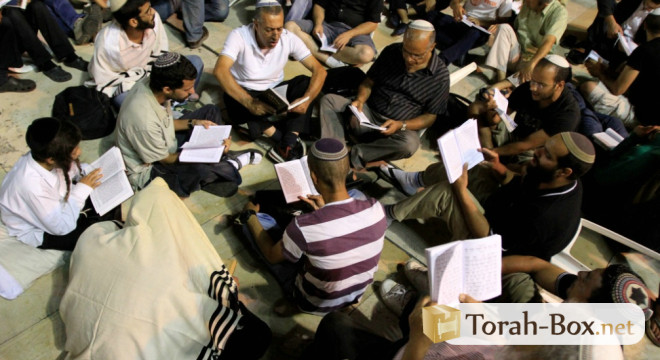
Fast of the 17th of Tammuz
Can One Really Cry Over the Destruction of the Temple?
The month of Av is here. The three-week period between the 17th of Tammuz and the 9th of Av has begun. The fast of the 9th of Av, when we sit together in houses of prayer to mourn the destruction of the Temple is fast approaching. On this mournful day, we read Megillat Eicha (Book of Lamentations) and Kinnot (woes).
I wonder why we mourn the destruction of the Beit Hamikdash (Temple) every year? So many years have gone by since it was wiped out. Most of the Jews have already settled in the land of Israel. We have a strong army and diplomatic relations with many states and nations around the world.
A More Relevant Question to Focus on Is Not Why We Mourn, but Rather, How Can We Bring Ourselves to Mourn?
How can I sit on the floor and mourn the loss of a Beit Hamikdash, which I never merited to see, and which was destroyed long before my grandfather's grandfather was born? Should I also mourn the loss of my uncle David who died 50 years ago when my father was still a newborn? How is it possible to lament something we have no clue about?
These questions were raised to Rabbi Moshe Cohen, author of the book "Mamlechet Kohanim".
Rabbi Moshe Cohen replied: "When we cry over the destruction of the Temple, we do not cry for its wonderful architecture, intricate woodwork and stone. We do not mourn the past, we mourn the present, we lament what is happening now in real time.
We can mourn at various levels. Some mourn the exile of the Shechina (Divine Presence), sadly hovering outside her destroyed and ravaged house. Hashem ardently desires the offerings of the Jewish People, but we are unable to bring them forth to please Him. This is truly heartbreaking.
One may mourn over the general standing of the people of Israel. Despite living in the Land of Israel, having a powerful army and a self-elected government, we are in exile. We are still dependent on the goodwill of the United States and whether it will veto Security Council resolutions against us. We are also dependent on the whims of Hamas, whose missile attacks can generate a pandemonium, urging every Israeli to run for his life with only 30 seconds to make it to the bomb shelter. We are prey to Hezbollah which is armed to the teeth and threatening to launch 100,000 missiles on our cities.
The destruction of the Beit Hamikdash is not a bygone tragedy. It is a continuous tragedy that impacts all areas of our lives.
There are facets of mourning and destruction that touch every single one of us. When the sounds of the Final Deliverance are heard, all the sick will heal, the dead will resurrect, our life will be pleasanter and more cheerful. Some books describe that when the Beit Hamikdash was destroyed the Heavens lost their luminosity. And ever since, everything is gloomier and darker because we have not yet been redeemed.
Each one of us can and must find a way to relate to the subject of destruction. Everyone must soul search and take an honest look at his material and spiritual microcosms, acknowledge the things and situations he has destroyed, as well as the areas in his life that call for work and improvement; and cry over his flaws and failures.
And with the help of God, we will soon deserve to see the promise of our Sages come true: "Anyone who mourns the destruction of Jerusalem will deserve to witness its reconstruction."
Torah-Box.net Account
To access the entire Torah-Box.net website, sign up for free in less than a minute.
Weekly Parsha
 Candle Lighting - New York
Candle Lighting - New York
Friday February 27th, 2026 at 17:27 *Shabbat ends at 18:27 *
change my location
* Times given as an indication, check the times of your community


![[Print] Forbidden & Permissible actions during "the 3 weeks"](https://media.torah-box.net/165x90/ben-hametzarim-4514.jpg)








